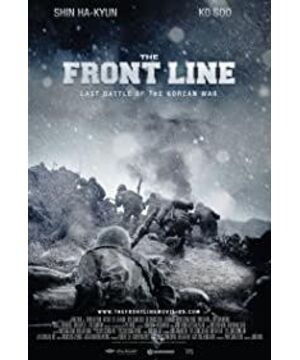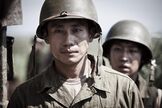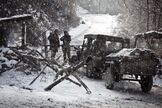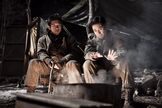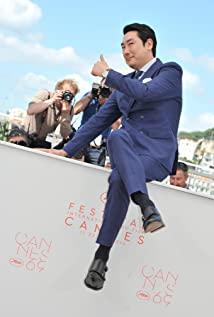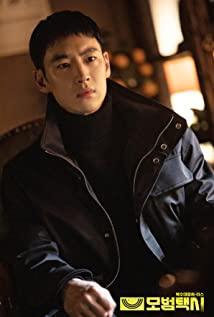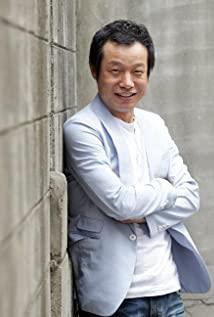Apart from Japan, can there be no reliable war movies in East Asian countries?
I don't remember which Korean war movie "Highland War" was highly recommended by a friend. Although there are too many unreasonable things about "The Tai Chi Flag Flying High", it really surprised me. I have taken a high look at Korean movies since then, but if compared with European, American and even Japanese war movies, the gap is still obvious. In short, Excessive sensationalism. Compared with my dynasty, of course it is not bad. But I always thought that South Korea, a free world, has a large-scale film industry and naturally has higher requirements, so it can shoot better. But after watching "Highland War", I have to say that although the film has a lot of investment and magnificent scenes, this film that tries to show the cruelty and ruthlessness of war is too violent and sensational, although the partial shooting is tragic Realistic, but this highland sprinkled with countless blood, in my opinion, is sprinkled with dog blood everywhere.
Yes, this movie made me understand a truth. A stupid director like Lu Chuan is not a Chinese specialty, and the great Republic of Korea has not been spared.
The plot can be skipped directly here. The main core of the whole story is that because the highlands repeatedly changed hands, the North and South Korean soldiers who confronted each other reached a tacit understanding, burying gifts at fixed locations and giving them to each other. The location where the gift was buried seems to be a very simple hidden part of the highland ridge. The hidden part is about 15 square meters in size. There is an ammunition box buried in the pit in the middle.
The problem is that this little plateau has changed hands countless times, but the hideout on the ridge has not been damaged. With the intensity of artillery fire on the Korean battlefield, the topography of this repeatedly contested highland should change every day, and it is incredible that a hidden part built on a ridge covered with wood can survive all the time.
It stands to reason that this kind of highland, which has been repeatedly contested for a long time, has only a few trenches on the ridge that are repeatedly dug and can be used by both sides. The normal state of competition for high ground is that the side occupying the high ground, the main force is hidden in the fortifications on the reverse slope, and a few occupy the front line of tunnels and trenches. When the opponent attacked, wait for the opponent's artillery to destroy the fortifications on the ridge. If the artillery stopped, it probably means that the attacker's infantry was approaching the top of the mountain. At this time, the surviving soldiers of the defending side rushed to the ridge immediately, occupying a favorable position and sniping at the opponent's infantry.
In this case, if the soldiers of both sides want to give gifts to the other side, the reasonable burial location should only be in the bunker on the side of our side or the bunker on the side of the enemy side. The possibility of trenches on the ridge is low, because once High ground changes hands, and long-range artillery fire from the lost side usually quickly bombards the high ground already occupied by the enemy.
Of course, on the Korean battlefield, the coalition's artillery had sufficient ammunition and responded quickly, while the Chinese and North Korean artillery often suffered from insufficient ammunition. After the South Korean army captured the high ground, there was no need to worry about the Chinese and North Korean artillery retaliation. In any case, if there is such a tacit understanding between the two parties, the process of burying and finding gifts is much more complicated and, of course, more interesting. The plot is based on the real situation of the Korean War, and I think the movie is much more watchable. In the hands of people like Spielberg, it must be slowly unfolded in an environment that is highly close to reality, a highland that has been repeatedly fought for and has finally lost its meaning in the eyes of the soldiers on both sides. Fa unexpectedly exchanged gifts two or three times by accident, and even entrusted the other party to bring family heirlooms. Let's assume that when the soldiers here see the other party's family letter, they will deduce a little bit about the plot. A good director is confident enough to impress the audience.
The problem is, the director of "Highland War" apparently doesn't think so.
In order to let the audience experience the cruelty of the war, he even let the two company-level combat units compete for a high ground with each other for at least nearly a year. When the protagonist A arrived at the high ground in January 1953, the protagonist B Said he remembered that the two sides had changed hands 30 times, and that until the armistice in July, the fight was almost non-stop. On the side of the Korean Crocodile Squadron, the commander is a captain, and the opposite North Korean commander is a lieutenant. These two companies ruthlessly slaughtered each other while giving each other gifts in dozens of offense and defense transitions.
Is war cruel? Distortion of human nature? I think this film, the director can't even add subtitles to the picture, here it reflects the war's distortion of human nature, and here it reflects sometimes the warmth of human nature in the war.
The problem is, with the fighting intensity shown in the film, every time the highland changes hands, both the offensive and defensive sides should be disabled, and both sides will soon be replaced with a new company-level combat unit. The two companies faced off for nearly a year.
Of course, to say that its battle scenes are tragic and realistic is only relative to the piles of war movies in the Chinese dynasty in recent years. In this film, every time the South Korean side attacked the high ground, at most, only the American Mustang fighter bombed one round, and never saw a large-scale artillery bombardment from the rear. Naturally, none of the North Korean soldiers hiding in the cave would die, but when the Korean infantry attacked, they charged intensively in a narrow frontal area—it’s hard to imagine that one at the bottom of the mountain even attacked one on the mountain in this way. Lian, not only did not die, but actually took the high ground. Of course, it is even more outrageous that the North Korean one can even turn back and drive them away, because they are rushing up in broad daylight without an aircraft attacking the ground.
I think that the film is so unreasonable, probably because the screenwriter first conceived a wonderful story: the long-term confrontation made the soldiers on both sides tired of the war, so the two sides frequently exchanged gifts before switching between the offensive and defensive. In order to emphasize the cruelty of the war, the background of this story It was set up for the high ground that has been contested dozens of times. The problem is, the story could have worked, but the setting made it impossible for it to happen.
In "Highland War", there are many places where the plot goes too far to the level of bloodshed, such as the painful memories and mental trauma of the veterans of the Crocodile Squadron of the Battle of Pohang. It was originally designed to reflect the cruelty of the war, but the battle scenes in the film Sweeping it away, the after-effects of several experienced people not only puzzled the audience, but even inexplicable - the number of deaths in the Battle of Pohang was equal to the number killed by the beautiful sniper on the North Korean side - since today's calm Going to the place of death, why is the memory of the past still ferocious.
This plot thread, which is worth less than the appendix, is not too much.
Excessive, it is a lot of coincidences that spill blood:
The first is the commander of the North Korean lieutenant, who was the commander who captured the protagonists A and B back then. After B died, A and the North Korean commander had two deep conversations with bloodshed;
the second was the nickname of the North Korean The "two-second" marksman is a beautiful woman. When B saw the photo in the letter from the beautiful woman's home, he mistakenly thought that the beautiful killer dressed as a student was still in the back, and announced that he would marry the female killer after the war, and was shot and killed by the female killer. , and A saved the beautiful woman's life before B was killed by the beautiful woman...
The more bloody place is still behind: after the armistice agreement was signed, A met the beautiful woman and returned the photos with B's blood and bullet holes to her. Beauty - that's right, the dog's blood hasn't been played yet, because the agreement still has 12 hours to go into effect - by the way, there are 12 hours left when the agreement is signed, and the superior commander still has 12 hours left to give orders, and the Crocodile Squadron has all kinds of options. Reluctance plus repeated mobilization to reach the attack site with 12 hours left - isn't this a crossing? ——Let's continue the bloody shit, and then, in the final battle, B and the female killer meet again on a narrow road. In the hand-to-hand fight, A didn't let her go at once, but copied "Saving Private Ryan" The cruel shot in the picture: a dagger slowly but firmly and indifferently stabbed into the chest of the beautiful killer.
In my opinion, in "Highland Battle", which is a collection of all sorts of incredible coincidences, any one of those small-probability incidents spilling blood can be a success. It's a war movie, but in a movie less than two hours and ten minutes in length, with such a large number of bizarre things with small probability all mixed together, even if the actors are all veteran actors, they will act stupid. In this movie, all the actors have a big line engraved on their foreheads: War is cruel. There are many small prints below, and I will not repeat them.
People who haven't seen this film want to know where this highland belongs? It's okay to leak the plot. I think you can probably guess that the two sides happened to die with one person left, A on the South Korean side, and the lieutenant commander on the North Korean side. As you must have guessed, the two met again in the hidden department made of firewood. Drink and smoke. Then, A repeated what the Joseon lieutenant said three years ago: Do you know why you lost the battle? Because you don't know what you're fighting for.
Then, a broadcast sounded outside: All fronts cease all hostilities. Then, A and the North Korean officer turned around, and behind them was a highland covered in blood.
View more about The Front Line reviews


